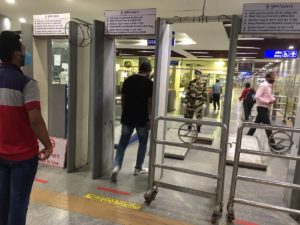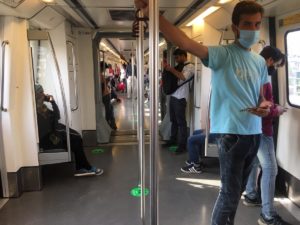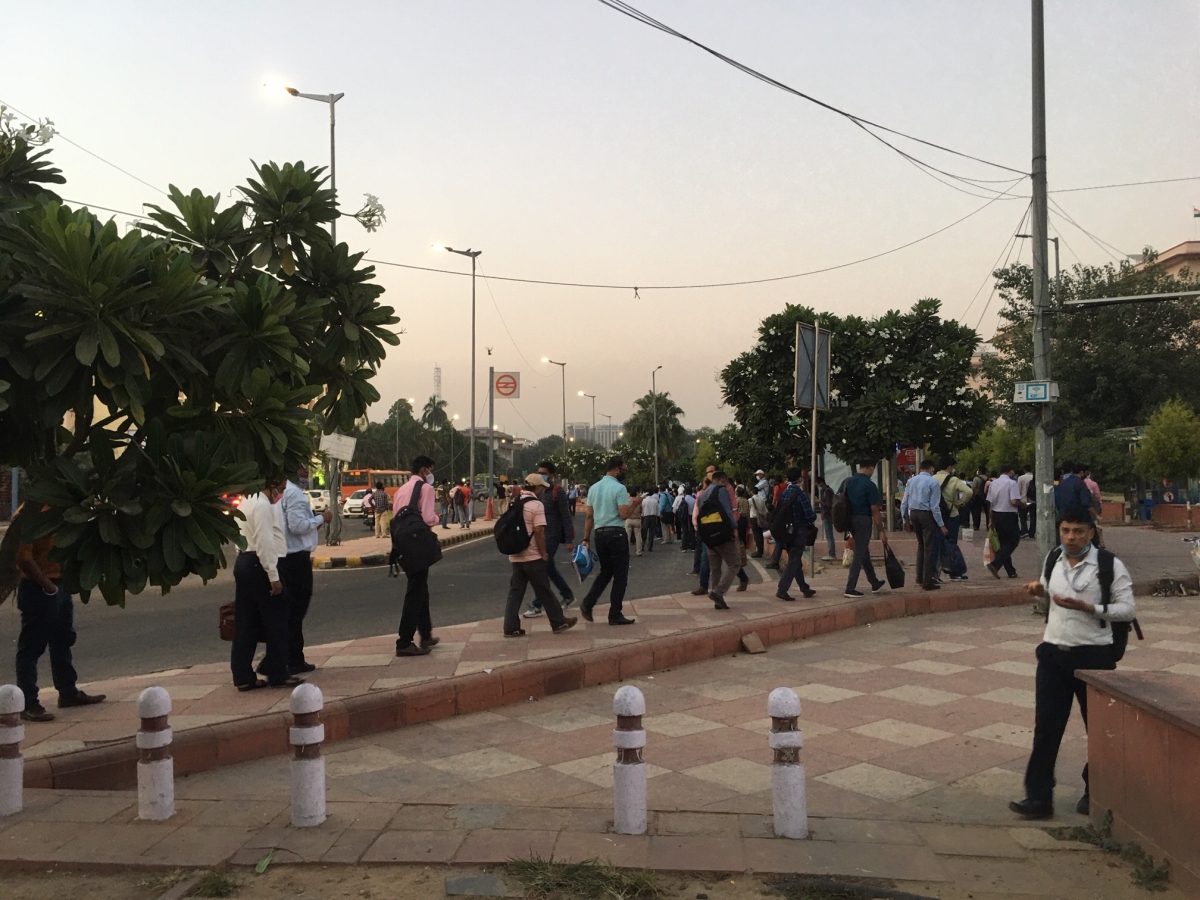A sub-inspector and a head constable of the CISF talk about the challenges to keep Delhi Metro safe for commuters in a pandemic
One of the toughest and the riskiest jobs in Delhi is to provide security cover to Delhi Metro that connects three different states that are part of the NCR—namely Delhi, Uttar Pradesh and Haryana.
The numbers have not yet picked up after the lockdown was lifted—some 10 lakh journeys are taking place on Delhi Metro as opposed to 55-60 lakh journeys before the pandemic. Commuters are still hesitant about using the Metro but slowly the numbers are rising.
During office hours, it actually gets crowded, with long queues extending up to 300 metres can be seen outside the Metro stations, waiting patiently to enter the complex. This is a regular feature in the evenings in Rajiv Chowk, Central Secretariat, Old Delhi and Nehru Place, to mention a few.
The Central Industrial Security Force (CISF) is in charge of the security of the Metro; 9,000 personnel are sanctioned for the Delhi Metro, about 7,000 are deployed on a regular basis, while the rest are on standby to be deputed depending on ‘internal security pattern’ or meet the increasing demand for manpower owing to the expansion of Delhi Metro by opening new routes.
In addition, the Delhi Metro Rail Police has eight police stations for Delhi Metro and Airport Express Line headed by DCP/Metro & Railways. The rail police has to ensure the maintenance of law and order; prevent and detect crime and secure ‘circulating areas and parking lots.’
CISF personnel are not allowed to speak to the media unless this has been sanctioned by the headquarters—as it involves classified information about the security plan. Patriot’s request is pending with the CISF headquarters but some CISF personnel agreed to discuss the impact of this high-risk job on their family life.
A sub-inspector level officer who is in charge of a station in Central Delhi… says, “A lot of VIPs enter the system from my station,” some of them he has seen on television, that was before the pandemic. A simple fellow, he was recently transferred to Delhi, earlier was employed in another metropolis where he was part of the team providing security to an international airport. His family has not moved to Delhi.

He is seen sitting just before the security counter spraying disinfectant for the customers. He explains the basic idea behind the security cover which is “prudent pessimism” that entails thorough frisking of commuters and all their possessions. Equipment like XBIS, DFMD, HHMD has been put into service. Since the pandemic, adequate social distancing measures have been introduced, the force shall be ensuring appropriate social distancing measures, also are provided with masks and gloves.
The sub-inspector is satisfied with the measures in place. “This is the best possible” he says, though he qualifies his statement by saying the system “might not be full-proof.” He explains that despite everything he personally doesn’t feel safe. He sometimes wakes up in the night feeling he can’t breathe properly. He is glad that his family is away and thinks loudly, “I cannot but feel that it’s a war-like situation, and no one really feels safe, but life has to find a way to go on.”
He introduces to a head constable who has shifted is with him and is not living with his family ever since he has been deployed with Delhi Metro. “Hundreds of people come and go. You can never be sure, though we adhere to the safety protocol even if this slows us down.”
He explains that his unit is not only providing security but is also a shield that is supposed to prevent the spread of the pandemic. “I have not seen my family for two weeks. And I will observe the situation for some time before deciding to get back to living in my quarter,” he says.
The head constable is from Tamil Nadu and is fairly comfortable speaking in Hindi. He draws a distinction between an airport and Delhi Metro. “Commuters in the airport are far more cooperative, which is not the case with Delhi Metro,” he says. There are times people enter into an argument, or do not cooperate, or want to carry proscribed items, or are not following social distancing norms on the train.
“It becomes really difficult to deal with them. The queues get very long and unending and the people keep trickling in, some are impatient, and do things like jumping the queue, or standing too close, jeopardising the security of everyone.”
The instructions are clear: no tolerance to errant commuters and lately, they are also very strict about not letting inebriated people use the system. A sales executive who, after having a few beers tried boarding Delhi Metro from Khan Market at 4 pm on Monday was denied entry on the ground that he was visibly drunk.

There have been cases where CISF personnel tested positive, only some of them were reported, “But that’s the case not only here at stations of Delhi Metro, but also at airports and even at the headquarters,” explains the sub-inspector.
There’s a quick reaction team in place that takes care of the situation. The CISF personnel with overt Covid symptoms are immediately isolated and tested, if positive, are admitted to a hospital, and all those in contact with them are home quarantined, according to the prescribed protocol.
However, despite the risk, the sub-inspector agrees now the situation seems to be limping back to normalcy and he’s not as anxious as he was in the first week. This is despite the number of people commuting on Metro increasing with every passing day.
“Peak hour management must be done, people should be allowed to leave work from 4 to 7 pm, instead all of them together,” he suggests. “If social distancing is maintained, Metro is fairly safe,” he says with an air of confidence, “We will make sure it’s safe and that’s the only way we will remain safe.”





